Case Study: Health Care Ethics and Patient Rights Analysis
VerifiedAdded on 2021/06/16
|5
|960
|25
Case Study
AI Summary
This case study analyzes a healthcare ethics dilemma concerning a patient, Amos, who was denied medical treatment by a hospital, leading to his death. The analysis examines the legal and ethical implications of this refusal, focusing on the patient's right to healthcare, dignity, and the hospital's obligations under the Emergency Medical Treatment and Active Labor Act (EMTALA). The document highlights how the hospital's actions, based on resource constraints and Amos not being a school resident, violated ethical principles and potentially legal requirements. It references relevant laws, ethical guidelines, and the importance of patient care and transfer protocols in emergency situations. The study emphasizes the importance of upholding patient rights and the consequences of undermining human dignity in healthcare settings.
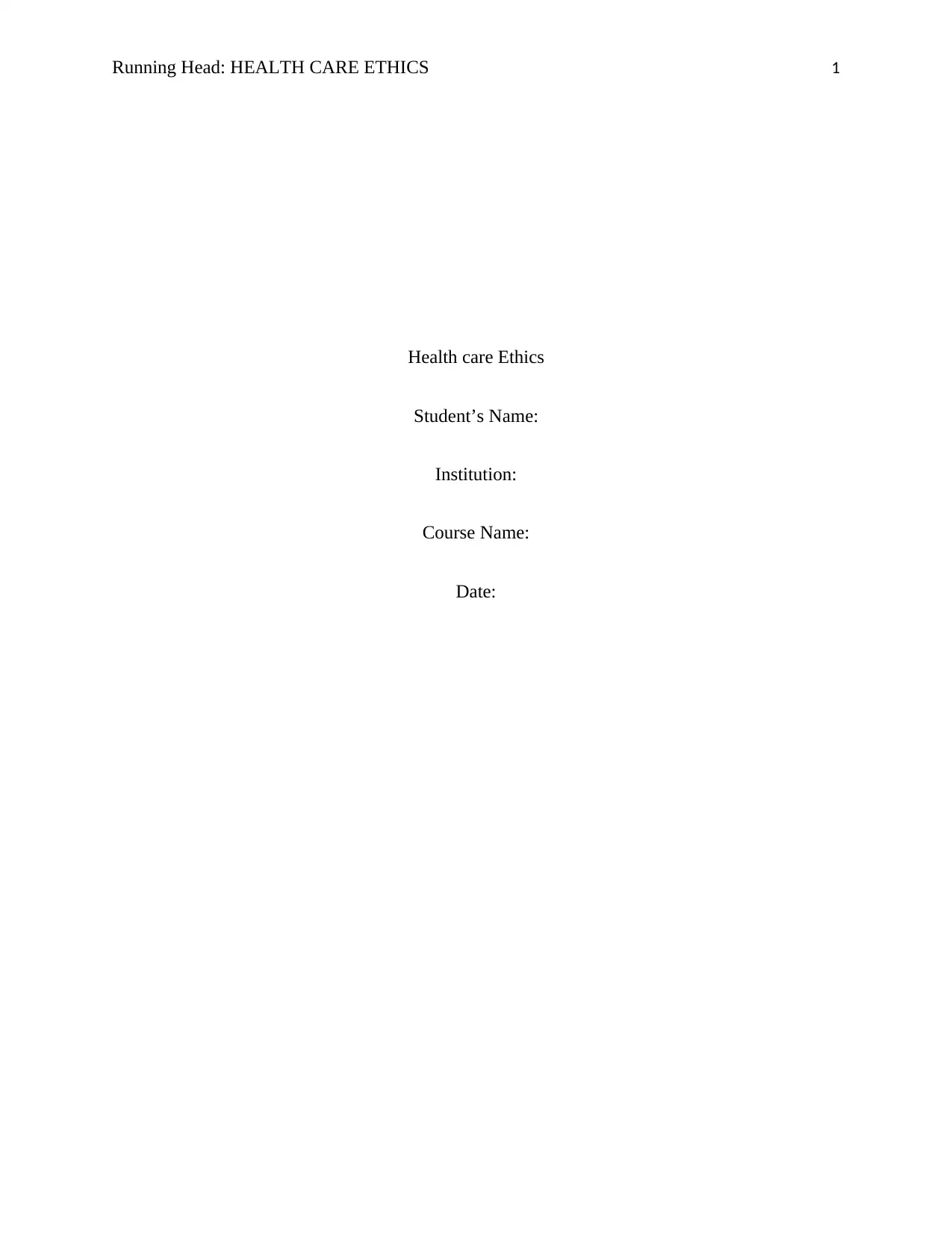
Running Head: HEALTH CARE ETHICS 1
Health care Ethics
Student’s Name:
Institution:
Course Name:
Date:
Health care Ethics
Student’s Name:
Institution:
Course Name:
Date:
Paraphrase This Document
Need a fresh take? Get an instant paraphrase of this document with our AI Paraphraser
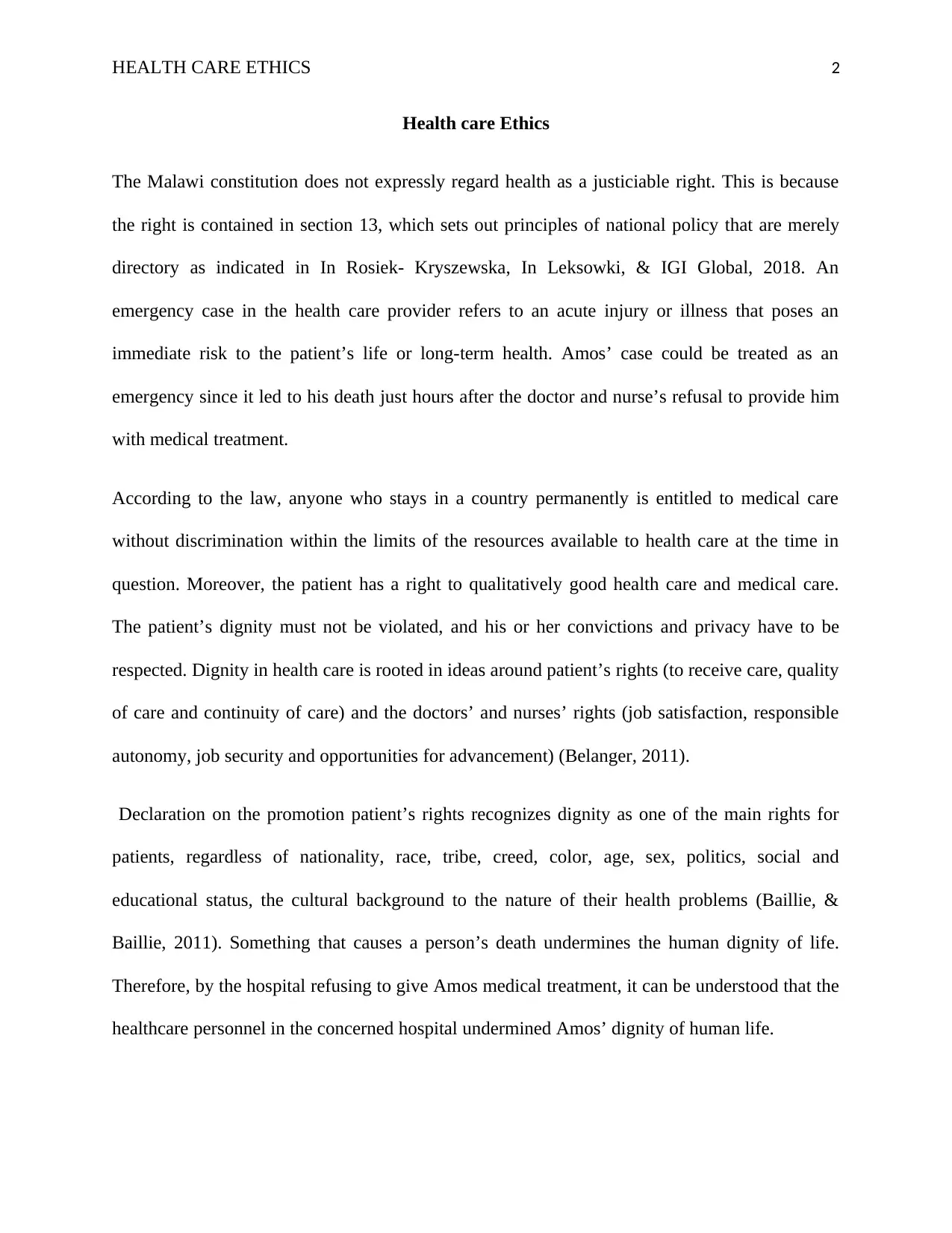
HEALTH CARE ETHICS 2
Health care Ethics
The Malawi constitution does not expressly regard health as a justiciable right. This is because
the right is contained in section 13, which sets out principles of national policy that are merely
directory as indicated in In Rosiek- Kryszewska, In Leksowki, & IGI Global, 2018. An
emergency case in the health care provider refers to an acute injury or illness that poses an
immediate risk to the patient’s life or long-term health. Amos’ case could be treated as an
emergency since it led to his death just hours after the doctor and nurse’s refusal to provide him
with medical treatment.
According to the law, anyone who stays in a country permanently is entitled to medical care
without discrimination within the limits of the resources available to health care at the time in
question. Moreover, the patient has a right to qualitatively good health care and medical care.
The patient’s dignity must not be violated, and his or her convictions and privacy have to be
respected. Dignity in health care is rooted in ideas around patient’s rights (to receive care, quality
of care and continuity of care) and the doctors’ and nurses’ rights (job satisfaction, responsible
autonomy, job security and opportunities for advancement) (Belanger, 2011).
Declaration on the promotion patient’s rights recognizes dignity as one of the main rights for
patients, regardless of nationality, race, tribe, creed, color, age, sex, politics, social and
educational status, the cultural background to the nature of their health problems (Baillie, &
Baillie, 2011). Something that causes a person’s death undermines the human dignity of life.
Therefore, by the hospital refusing to give Amos medical treatment, it can be understood that the
healthcare personnel in the concerned hospital undermined Amos’ dignity of human life.
Health care Ethics
The Malawi constitution does not expressly regard health as a justiciable right. This is because
the right is contained in section 13, which sets out principles of national policy that are merely
directory as indicated in In Rosiek- Kryszewska, In Leksowki, & IGI Global, 2018. An
emergency case in the health care provider refers to an acute injury or illness that poses an
immediate risk to the patient’s life or long-term health. Amos’ case could be treated as an
emergency since it led to his death just hours after the doctor and nurse’s refusal to provide him
with medical treatment.
According to the law, anyone who stays in a country permanently is entitled to medical care
without discrimination within the limits of the resources available to health care at the time in
question. Moreover, the patient has a right to qualitatively good health care and medical care.
The patient’s dignity must not be violated, and his or her convictions and privacy have to be
respected. Dignity in health care is rooted in ideas around patient’s rights (to receive care, quality
of care and continuity of care) and the doctors’ and nurses’ rights (job satisfaction, responsible
autonomy, job security and opportunities for advancement) (Belanger, 2011).
Declaration on the promotion patient’s rights recognizes dignity as one of the main rights for
patients, regardless of nationality, race, tribe, creed, color, age, sex, politics, social and
educational status, the cultural background to the nature of their health problems (Baillie, &
Baillie, 2011). Something that causes a person’s death undermines the human dignity of life.
Therefore, by the hospital refusing to give Amos medical treatment, it can be understood that the
healthcare personnel in the concerned hospital undermined Amos’ dignity of human life.
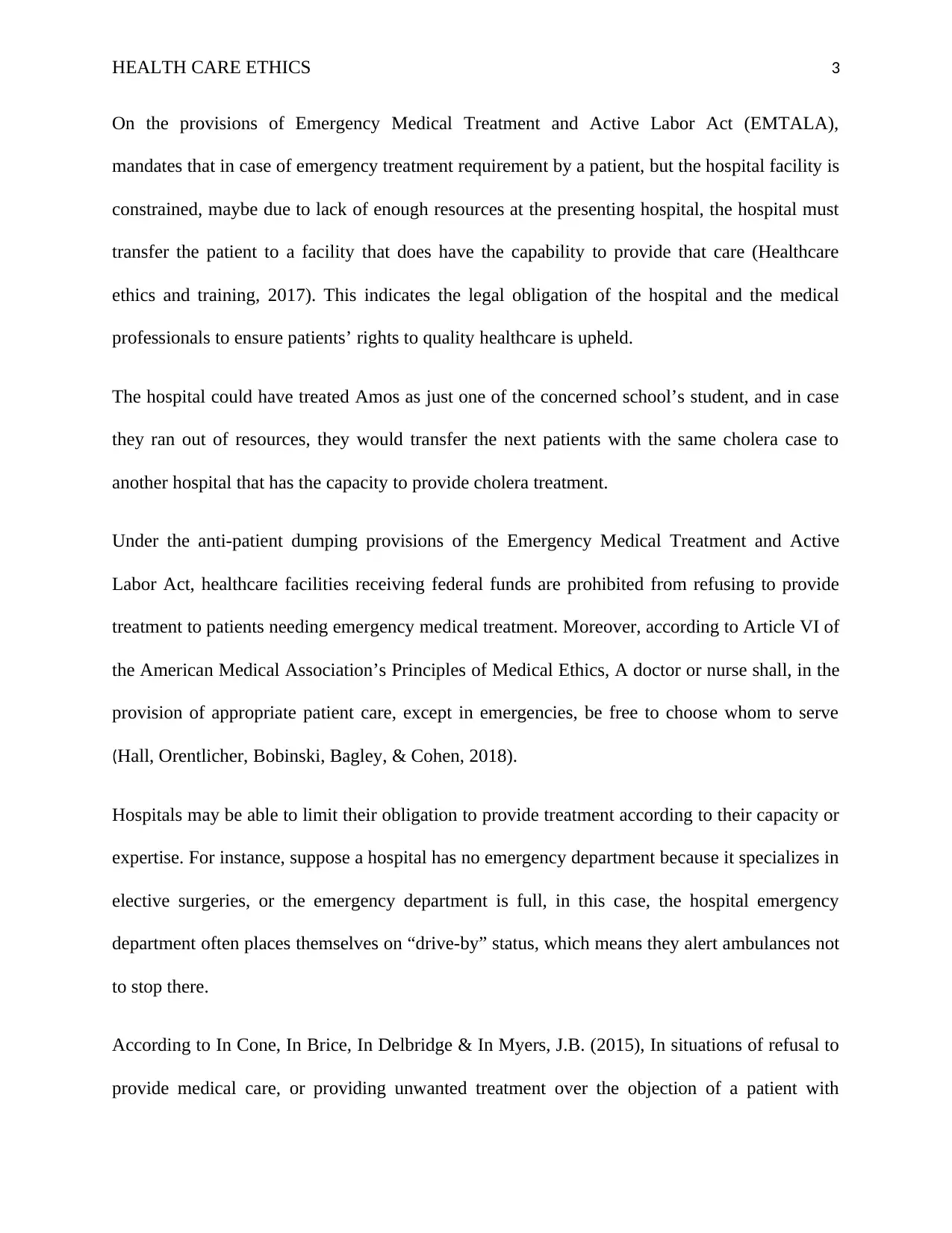
HEALTH CARE ETHICS 3
On the provisions of Emergency Medical Treatment and Active Labor Act (EMTALA),
mandates that in case of emergency treatment requirement by a patient, but the hospital facility is
constrained, maybe due to lack of enough resources at the presenting hospital, the hospital must
transfer the patient to a facility that does have the capability to provide that care (Healthcare
ethics and training, 2017). This indicates the legal obligation of the hospital and the medical
professionals to ensure patients’ rights to quality healthcare is upheld.
The hospital could have treated Amos as just one of the concerned school’s student, and in case
they ran out of resources, they would transfer the next patients with the same cholera case to
another hospital that has the capacity to provide cholera treatment.
Under the anti-patient dumping provisions of the Emergency Medical Treatment and Active
Labor Act, healthcare facilities receiving federal funds are prohibited from refusing to provide
treatment to patients needing emergency medical treatment. Moreover, according to Article VI of
the American Medical Association’s Principles of Medical Ethics, A doctor or nurse shall, in the
provision of appropriate patient care, except in emergencies, be free to choose whom to serve
(Hall, Orentlicher, Bobinski, Bagley, & Cohen, 2018).
Hospitals may be able to limit their obligation to provide treatment according to their capacity or
expertise. For instance, suppose a hospital has no emergency department because it specializes in
elective surgeries, or the emergency department is full, in this case, the hospital emergency
department often places themselves on “drive-by” status, which means they alert ambulances not
to stop there.
According to In Cone, In Brice, In Delbridge & In Myers, J.B. (2015), In situations of refusal to
provide medical care, or providing unwanted treatment over the objection of a patient with
On the provisions of Emergency Medical Treatment and Active Labor Act (EMTALA),
mandates that in case of emergency treatment requirement by a patient, but the hospital facility is
constrained, maybe due to lack of enough resources at the presenting hospital, the hospital must
transfer the patient to a facility that does have the capability to provide that care (Healthcare
ethics and training, 2017). This indicates the legal obligation of the hospital and the medical
professionals to ensure patients’ rights to quality healthcare is upheld.
The hospital could have treated Amos as just one of the concerned school’s student, and in case
they ran out of resources, they would transfer the next patients with the same cholera case to
another hospital that has the capacity to provide cholera treatment.
Under the anti-patient dumping provisions of the Emergency Medical Treatment and Active
Labor Act, healthcare facilities receiving federal funds are prohibited from refusing to provide
treatment to patients needing emergency medical treatment. Moreover, according to Article VI of
the American Medical Association’s Principles of Medical Ethics, A doctor or nurse shall, in the
provision of appropriate patient care, except in emergencies, be free to choose whom to serve
(Hall, Orentlicher, Bobinski, Bagley, & Cohen, 2018).
Hospitals may be able to limit their obligation to provide treatment according to their capacity or
expertise. For instance, suppose a hospital has no emergency department because it specializes in
elective surgeries, or the emergency department is full, in this case, the hospital emergency
department often places themselves on “drive-by” status, which means they alert ambulances not
to stop there.
According to In Cone, In Brice, In Delbridge & In Myers, J.B. (2015), In situations of refusal to
provide medical care, or providing unwanted treatment over the objection of a patient with
⊘ This is a preview!⊘
Do you want full access?
Subscribe today to unlock all pages.

Trusted by 1+ million students worldwide
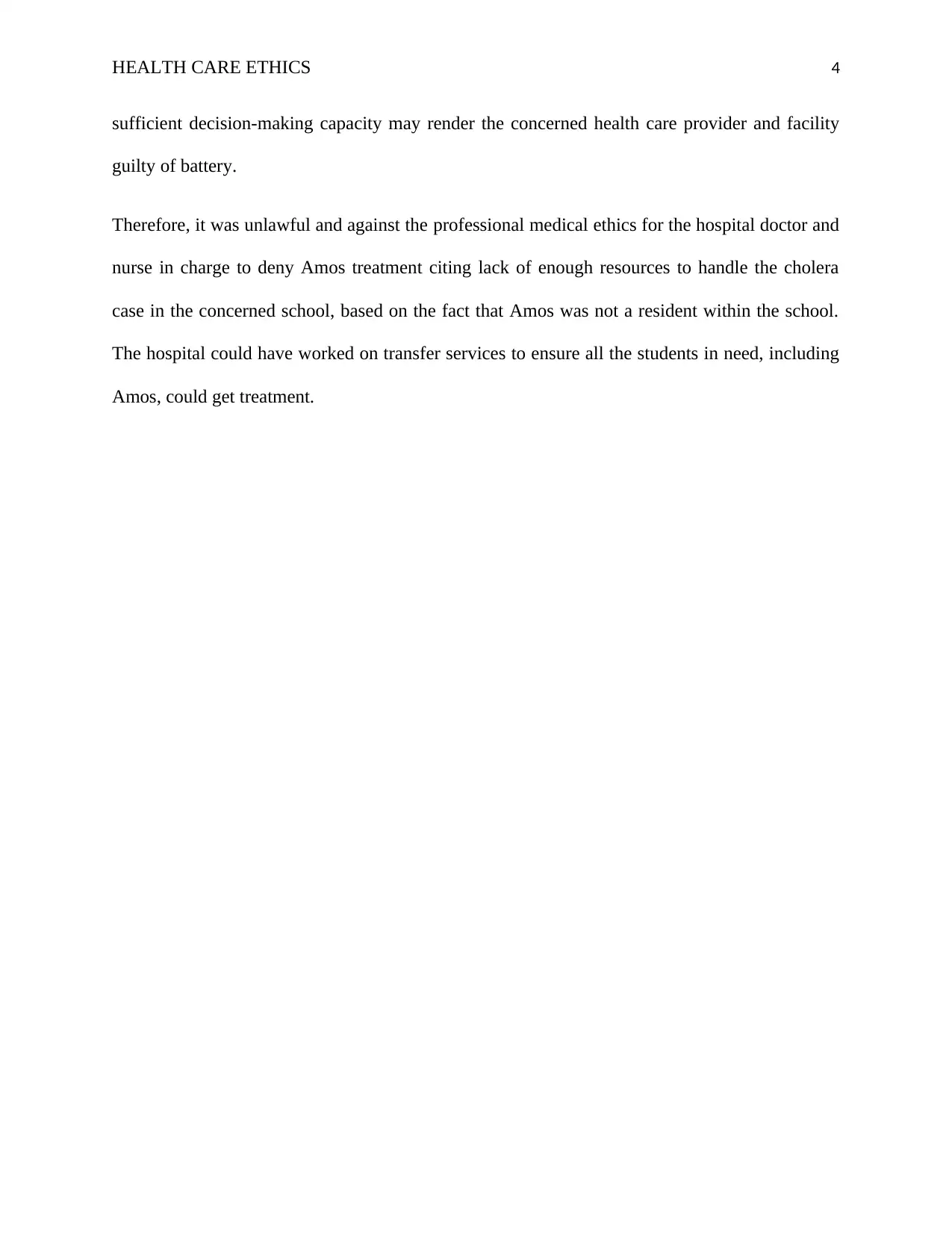
HEALTH CARE ETHICS 4
sufficient decision-making capacity may render the concerned health care provider and facility
guilty of battery.
Therefore, it was unlawful and against the professional medical ethics for the hospital doctor and
nurse in charge to deny Amos treatment citing lack of enough resources to handle the cholera
case in the concerned school, based on the fact that Amos was not a resident within the school.
The hospital could have worked on transfer services to ensure all the students in need, including
Amos, could get treatment.
sufficient decision-making capacity may render the concerned health care provider and facility
guilty of battery.
Therefore, it was unlawful and against the professional medical ethics for the hospital doctor and
nurse in charge to deny Amos treatment citing lack of enough resources to handle the cholera
case in the concerned school, based on the fact that Amos was not a resident within the school.
The hospital could have worked on transfer services to ensure all the students in need, including
Amos, could get treatment.
Paraphrase This Document
Need a fresh take? Get an instant paraphrase of this document with our AI Paraphraser
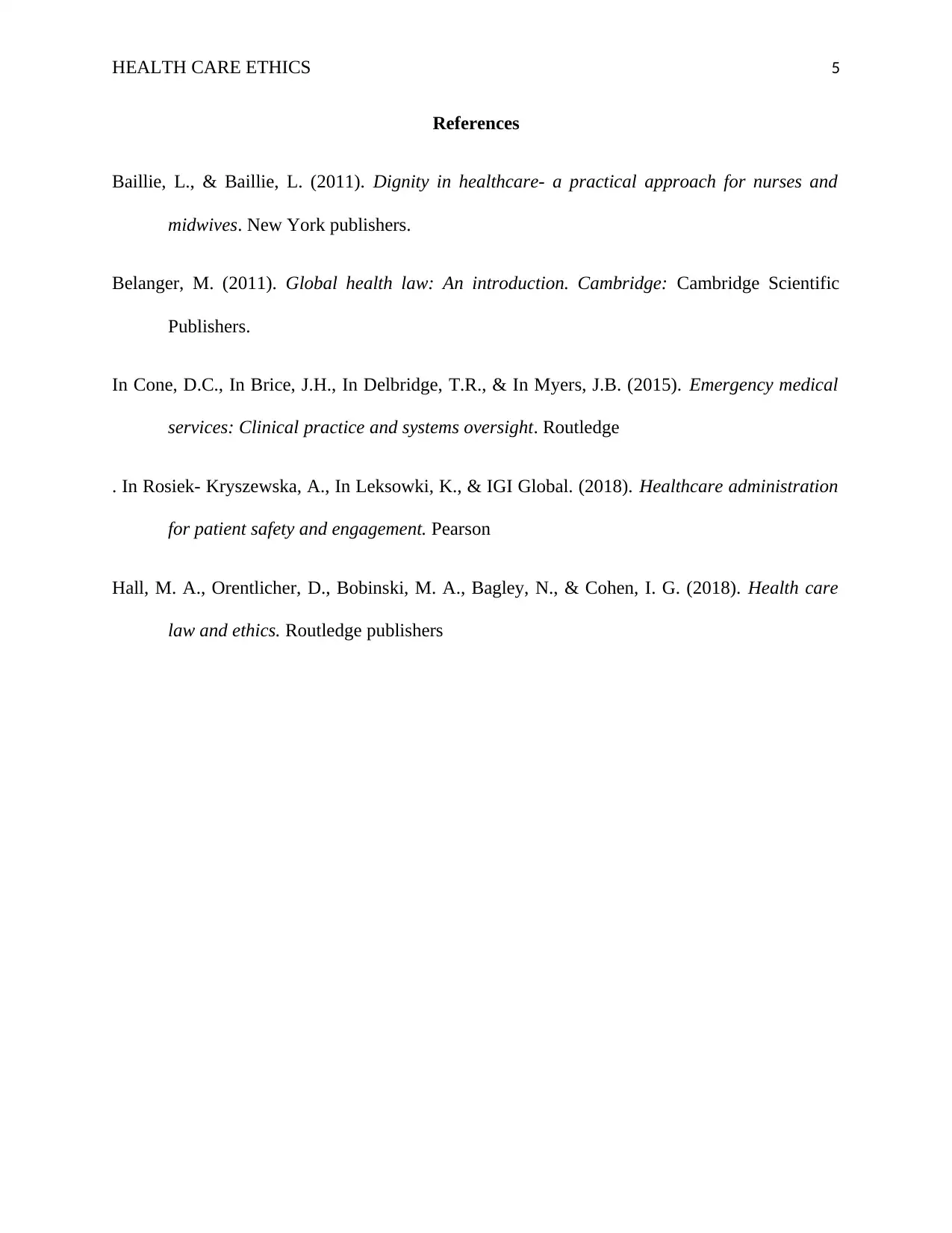
HEALTH CARE ETHICS 5
References
Baillie, L., & Baillie, L. (2011). Dignity in healthcare- a practical approach for nurses and
midwives. New York publishers.
Belanger, M. (2011). Global health law: An introduction. Cambridge: Cambridge Scientific
Publishers.
In Cone, D.C., In Brice, J.H., In Delbridge, T.R., & In Myers, J.B. (2015). Emergency medical
services: Clinical practice and systems oversight. Routledge
. In Rosiek- Kryszewska, A., In Leksowki, K., & IGI Global. (2018). Healthcare administration
for patient safety and engagement. Pearson
Hall, M. A., Orentlicher, D., Bobinski, M. A., Bagley, N., & Cohen, I. G. (2018). Health care
law and ethics. Routledge publishers
References
Baillie, L., & Baillie, L. (2011). Dignity in healthcare- a practical approach for nurses and
midwives. New York publishers.
Belanger, M. (2011). Global health law: An introduction. Cambridge: Cambridge Scientific
Publishers.
In Cone, D.C., In Brice, J.H., In Delbridge, T.R., & In Myers, J.B. (2015). Emergency medical
services: Clinical practice and systems oversight. Routledge
. In Rosiek- Kryszewska, A., In Leksowki, K., & IGI Global. (2018). Healthcare administration
for patient safety and engagement. Pearson
Hall, M. A., Orentlicher, D., Bobinski, M. A., Bagley, N., & Cohen, I. G. (2018). Health care
law and ethics. Routledge publishers
1 out of 5
Related Documents
Your All-in-One AI-Powered Toolkit for Academic Success.
+13062052269
info@desklib.com
Available 24*7 on WhatsApp / Email
![[object Object]](/_next/static/media/star-bottom.7253800d.svg)
Unlock your academic potential
Copyright © 2020–2026 A2Z Services. All Rights Reserved. Developed and managed by ZUCOL.




